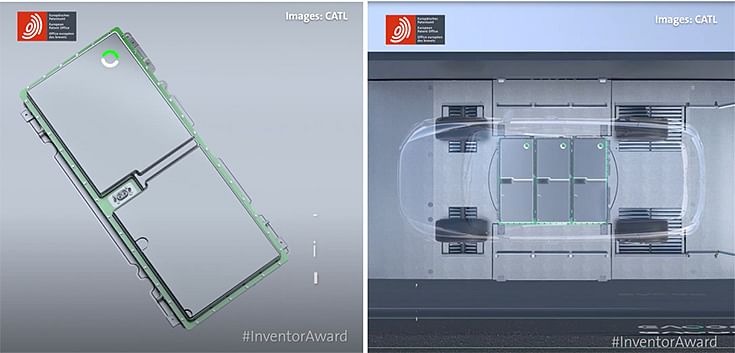CATL’s chief scientist Wu Kai wins European Inventor Award 2023
Wu Kai and his team have won the highly recognised innovation prize for lowering the risk of car explosions caused by lithium-ion batteries.
Wu Kai, the chief scientist of CATL, and his team have been awarded the European Inventor Award 2023 for the ‘Non-EPO countries’ category for their contributions to lithium-ion battery safety. The award ceremony was held in Valencia, Spain earlier this month.
"It is a great honour to win such a prestigious award, which will shine a path forward to further innovation efforts for me and CATL. What is more, electric vehicles powered by our advanced and safe batteries are enabling more people to embrace a sustainable lifestyle, contributing to the global energy transition. I hope that more and more inventors will dedicate themselves to the e-mobility and energy transition so that together we can develop more innovations for the benefit of mankind,” said Wu Kai.
Launched by European Patent Office (EPO) in 2006, the European Inventor Award is a global, highly recognised innovation prize which celebrates the Tomorrow Shapers – inventors whose perseverance, ingenuity and creativity are paving the way to a brighter future. The ‘Non-EPO countries’ category recognises the work of outstanding inventors from outside the EPO's 39-member states who have been granted a European patent.
As global pressure mounts to burn fewer fossil fuels, the automotive industry has been in a race to develop EVs. Although EVs are less likely to ignite than combustion engines, fires ignited in Li-ion batteries burn hotter and faster, require more water to be extinguished and can reignite hours or days later.
 Wu and his team developed a safety short circuit device integrated into the battery. When triggered, the invention would stop the EV battery charging, thus eliminating the risk of battery failure caused by overcharging.
Wu and his team developed a safety short circuit device integrated into the battery. When triggered, the invention would stop the EV battery charging, thus eliminating the risk of battery failure caused by overcharging.
Innovative safety short circuit device
Wu Kai and his team have won the European Inventor Award 2023 for lowering the risk of car explosions caused by lithium-ion batteries. Wu’s team developed a safety short circuit device (SSD), a protection device integrated into the battery. When triggered, the invention would stop the battery charging, thus eliminating the risk of battery failure caused by overcharging.
Together with his team at CATL, Wu has driven battery developments for over a decade. His journey began when BMW, one of the company's customers, asked the CATL team to minimise the risk of battery fires caused by overcharging.
The solutions developed by Wu and his team include a safety device that short-circuits an overcharged battery. The device features an embossed flip-top cover which does not melt – a unique feature in such devices. The cover acts as a barrier that dissipates heat and absorbs the temperatures and excess pressure. When overheating inside a battery cell causes the air pressure to rise, the cover flips and makes contact with the conductive pole piece in the battery, thereby stopping the charging process.
Li-ion battery cathodes are traditionally made of lithium, nickel, cobalt and manganese (NCM) and are prone to overheating. Wu and his co-inventors experimented with Li-ion phosphate as it has a low energy density and operates at a low voltage range. When overcharged, Li-ion phosphate will not overheat, making it a safer choice for batteries. In traditional EV batteries, individual modules are connected to one another to form a battery pack. Since 2019, Wu and his team have been working on cell-to-pack (CTP) technology, which uses a single integrated structure for the pack. This structure optimises the space used in the battery pack and increases the pack's energy density.
Chinese battery giant CATL (Contemporary Amperex Technology Co Ltd) was the world’s leading supplier for electric car batteries in 2022, according to South Korean research firm SNE research. The Chinese manufacturer sold 165.7GWh of batteries between January and November last year, tripling the output of BYD.
It has several partnerships with EV manufacturers, including BMW (which it will supply cylindrical cells to from 2025) and Ford (which will licence CATL’s lithium-iron-phosphate technology to build cells in Michigan, US).
RELATED ARTICLES
Autoliv Plans JV for Advanced Safety Electronics With China’s HSAE
The new joint venture, which is to be located strategically near Shanghai and close to several existing Autoliv sites in...
JLR to Restart Production Over a Month After September Hacking
Manufacturing operations at the Tata Group-owned British luxury car and SUV manufacturer were shut down following a cybe...
BYD UK Sales Jump 880% in September to 11,271 units
Sales record sets the UK apart as the largest international market for BYD outside of China for the first time. The Seal...






 By Autocar Professional Bureau
By Autocar Professional Bureau
 20 Jul 2023
20 Jul 2023
 5736 Views
5736 Views





 Ajit Dalvi
Ajit Dalvi




